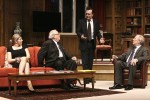Against the backdrop of a national IRS scandal, NSA wiretapping charges and the general absurdity of politics, “Yes, Prime Minister” could not have come at a better time.
Resurrected from the popular 1980s BBC political satire of the same name, “Yes, Prime Minister” brings the television show’s sharp British wit overseas to the Geffen Playhouse.
The ’80s British telly, however, better captures the genius of this political farce than the stage of the Geffen Playhouse in 2013.
This theatrical episode of “Yes, Prime Minister” follows British Prime Minister Jim Hacker, played by Michael McKean, through one disastrous night in Chequers, his polished country house retreat.
The prime minister is about ready to sign a delicate deal with the oil-rich nation of Kumranistan, one that could save the euro and his re-election. The only thing standing in his way is an odd sexual request from the Kumranistani foreign minister.
To save the deal, the prime minister must smuggle three multicultural prostitutes from London into Chequers, under the noses of security forces and the British public.
Matters go from bad to worse as problems with the press and troubles at home arise: The BBC threatens to skewer the prime minister in front of millions of viewers in a Sunday special program, while the head cook at Chequers is discovered to be an illegal immigrant, information that would guarantee more nasty headlines.
Dakin Matthews, in a strong performance, plays a self-appointed God figure as the pompous Cabinet Secretary Sir Humphrey Appleby. Humphrey is Jim’s self-interested but much-needed partner who uses his bureaucratic power and wisdom to pull political strings, with the prime minister and the British people left hanging to his will.
Matthews is supported by fellow civil servant Bernard Woolley, played by Tony award-winning actor Jefferson Mays, as Jim’s morally confused private secretary.
Colorful performances by both actors keep things light and bring to life the strange but formidable role of the civil service in the operation of the nation.
McKean’s performance as the prime minister is less impressive. It’s not just the gruff delivery: something about his aggressive, bullish portrayal draws an uncomfortable divide from the sympathetic, albeit selfish Brit immortalized on screen by the late Paul Eddington.
The transition to theater does bring with it a certain excitement. Plasma TVs mounted atop the seats of Geffen, thundering effects and a new physical, slapstick dimension to the comedy rope the audience in closer than the barrier of a TV screen can make possible.
Fans of the old show may notice Jim and Humphrey missing the mostly full head of hair they sported in the ’80s, courtesy of the 30 years’ passage into 2013 between the show and the play.
Whereas 2013 allows a new slew of American sex scandal references and Twitter jokes, the loss of the Cold War era renders the satire of British foreign relations somewhat worn out. References to American “advanced interrogation techniques” (waterboarding) and Italy’s legal age of consent (14) just don’t measure up to Cold War humor made at a time when such comedy was actually risky and edgy.
Nevertheless, the poignant debates, such as the moral righteousness of patriotic prostitution of three call girls between a desperate Jim and a confused Bernard, are as funny as ever; the delivery is solid, the writing is sharp and the timing is just right.
Bill Clinton, the Vatican and the entire continent of Europe all find themselves target to the critical eye and cynical wit of “Yes, Prime Minister,” amid broader themes of corruption on several levels, the religion of secularism and the moral conundrum of democratic government.
That’s a mouthful, and so is “Yes, Prime Minister.” On paper, it has sex, religion and politics, the makings of a good night of entertainment. It’s entertaining, but the wordy banter that made the show such a success loses power to the grandiose of the stage, where the dialogue-heavy style and lack of action seems misfit.
Despite the slight bumps, “Yes, Prime Minister” makes the journey overseas and through time well.
It’s the great Sir Humphrey who once said “plays criticizing the government make the second most boring theatrical evenings ever invented,” but “Yes Prime Minister” pleasantly surpasses its own label.
The most boring, in case you’re wondering, “are plays praising the government.”
